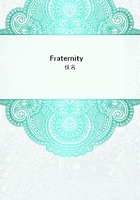
第64章
Like water, human character will find its level; and Nature, with her way of fitting men to their environment, had made young Martin Stone what Stephen called a "Sanitist." There had been nothing else for her to do with him.
This young man had come into the social scheme at a moment when the conception of existence as a present life corrected by a life to come, was tottering; and the conception of the world as an upper-class preserve somewhat seriously disturbed.
Losing his father and mother at an early age, and brought up till he was fourteen by Mr. Stone, he had formed the habit of thinking for himself. This had rendered him unpopular, and added force to the essential single-heartedness transmitted to him through his grandfather. A particular aversion to the sights and scenes of suffering, which had caused him as a child to object to killing flies, and to watching rabbits caught in traps, had been regulated by his training as a doctor. His fleshly horror of pain and ugliness was now disciplined, his spiritual dislike of them forced into a philosophy. The peculiar chaos surrounding all young men who live in large towns and think at all, had made him gradually reject all abstract speculation; but a certain fire of aspiration coming, we may suppose, through Mr. Stone, had nevertheless impelled him to embrace something with all his might. He had therefore embraced health. And living, as he did, in the Euston Road, to be in touch with things, he had every need of the health which he embraced.
Late in the afternoon of the day when Hughs had committed his assault, having three hours of respite from his hospital, Martin dipped his face and head into cold water, rubbed them with a corrugated towel, put on a hard bowler hat, took a thick stick in his hand, and went by Underground to Kensington.
With his usual cool, high-handed air he entered his aunt's house, and asked for Thyme. Faithful to his definite, if somewhat crude theory, that Stephen and Cecilia and all their sort were amateurs, he never inquired for them, though not unfrequently he would, while waiting, stroll into Cecilia's drawing-room, and let his sarcastic glance sweep over the pretty things she had collected, or, lounging in some luxurious chair, cross his long legs, and fix his eyes on the ceiling.
Thyme soon came down. She wore a blouse of some blue stuff bought by Cecilia for the relief of people in the Balkan States, a skirt of purplish tweed woven by Irish gentlewomen in distress, and held in her hand an open envelope addressed in Cecilia's writing to Mrs.
Tallents Smallpeace.
"Hallo!" she said.
Martin answered by a look that took her in from head to foot.
"Get on a hat! I haven't got much time. That blue thing's new.""It's pure flax. Mother bought it."
"It's rather decent. Hurry up!"
Thyme raised her chin; that lazy movement showed her round, creamy neck in all its beauty.
"I feel rather slack," she said; "besides, I must get back to dinner, Martin.""Dinner!"
Thyme turned quickly to the door. "Oh, well, I'll come," and ran upstairs.
When they had purchased a postal order for ten shillings, placed it in the envelope addressed to Mrs. Tallents Smallpeace, and passed the hundred doors of Messrs. Rose and Thorn, Martin said: "I'm going to see what that precious amateur has done about the baby. If he hasn't moved the girl, I expect to find things in a pretty mess."Thyme's face changed at once.
"Just remember," she said, "that I don't want to go there. I don't see the good, when there's such a tremendous lot waiting to be done.""Every other case, except the one in hand!"
"It's not my case. You're so disgustingly unfair, Martin. I don't like those people.""Oh, you amateur!"
Thyme flushed crimson. "Look here!" she said, speaking with dignity, "I don't care what you call me, but I won't have you call Uncle Hilary an amateur.""What is he, then?"
"I like him."
"That's conclusive."
"Yes, it is."
Martin did not reply, looking sideways at Thyme with his queer, protective smile. They were passing through a street superior to Hound Street in its pretensions to be called a slum.
"Look here!" he said suddenly; "a man like Hilary's interest in all this sort of thing is simply sentimental. It's on his nerves. He takes philanthropy just as he'd take sulphonal for sleeplessness."Thyme looked shrewdly up at him.
"Well," she said, "it's just as much on your nerves. You see it from the point of view of health; he sees it from the point of view of sentiment, that's all.""Oh! you think so?"
"You just treat all these people as if they were in hospital."The young man's nostrils quivered. "Well, and how should they be treated?""How would you like to be looked at as a 'case'?" muttered Thyme.
Martin moved his hand in a slow half-circle.
"These houses and these people," he said, "are in the way--in the way of you and me, and everyone."Thyme's eyes followed that slow, sweeping movement of her cousin's hand. It seemed to fascinate her.
"Yes, of course; I know," she murmured. "Something must be done!"And she reared her head up, looking from side to side, as if to show him that she, too, could sweep away things. Very straight, and solid, fair, and fresh, she looked just then.
Thus, in the hypnotic silence of high thoughts, the two young "Sanitists" arrived in Hound Street.
In the doorway of No. 1 the son of the lame woman, Mrs. Budgen--the thin, white youth as tall as Martin, but not so broad-stood, smoking a dubious-looking cigarette. He turned his lack-lustre, jeering gaze on the visitors.
"Who d'you want?" he said. "If it's the girl, she's gone away, and left no address.""I want Mrs. Hughs," said Martin.